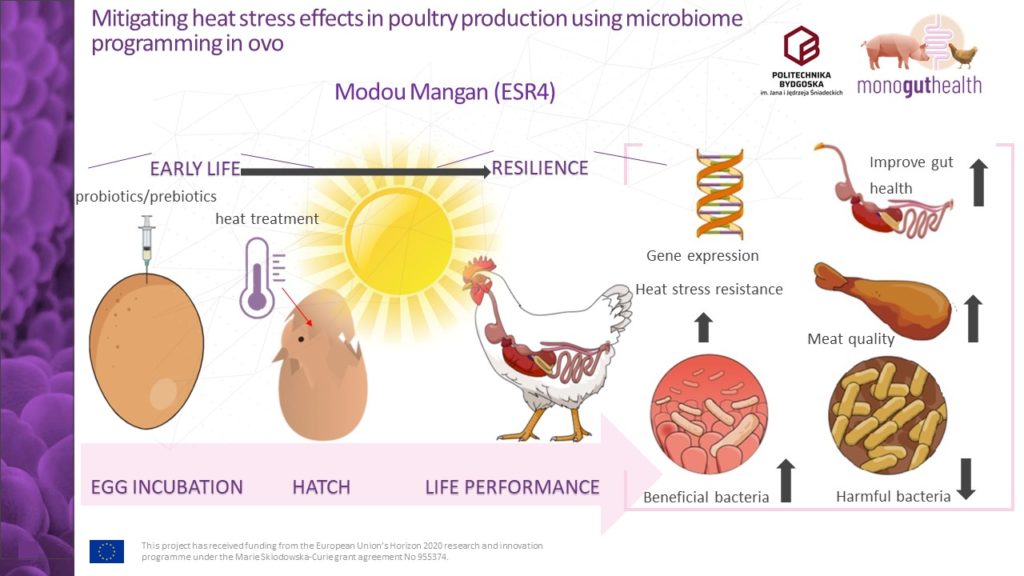ESR4: Mitigating heat stress effects in poultry production using microbiome programming in ovo
Background
Global climatic change is considered as one of the major environmental threats for broiler chickensChickens kept for meat production. Fast growing breeds can reach a weight of over 2 kg at 5 weeks of…. High ambient temperature causes metabolic changes inducing oxidative stress and acid-base imbalance, that subsequently affect the overall performance,health status and meat quality. PerinatalRelating to the time, immediately before and after birth. programming is gaining momentum as a strategy to mitigate environmental stressors and shape the resistance of an organism. Such an approach seems to be particularly justified in broilersChickens kept for meat production. Fast growing breeds can reach a weight of over 2 kg at 5 weeks of…, because in ovo development (21 days) equals the half of the post-hatch life span (42 days) of the chickens. We hypothesize, that the injection of pre-and/or probioticsLive microbial feed supplements, which beneficially affects the host animal by improving its intesti… at an optimal time point in ovo, can stimulate gut development and immune system, increasing the broiler’s capacity to resist heat stressA condition when animals do not have the ability to withstand high ambient temperatures especially w… challenges.
Objectives
Deliver industrial proof of concept targeting heat stressA condition when animals do not have the ability to withstand high ambient temperatures especially w... issues by microbiome programmingA targeted manipulation of the microbiota composition in a biological system. using pre- and/or probioticsLive microbial feed supplements, which beneficially affects the host animal by improving its intesti... delivered in ovo.
Validate the in vitro screening tests to design pre- and/or probioticsLive microbial feed supplements, which beneficially affects the host animal by improving its intesti... targeting heat stressA condition when animals do not have the ability to withstand high ambient temperatures especially w....
Methods
Selection of conditions: the pre/probiotics will be selected based on in vitro results and current state of knowledge, and the time point at which heat is disruptive will be provided.
Dosage testing: the optimal dosages of the selected pre-and/or probioticsLive microbial feed supplements, which beneficially affects the host animal by improving its intesti... will be determined in ovo, and the presence of probiotic strains in gut will be verified with RT-qPCR.
Rearing trial: the selected pre/probiotics will be injected in ovo and HS impact will be applied. The hatched chickens will be randomly allocated up to 8 zootechnical replicates/per treatment group, in an industrial setting. The penned broilersChickens kept for meat production. Fast growing breeds can reach a weight of over 2 kg at 5 weeks of... will be sampled for histological studies (gut and muscle tissues), gene expressionA process by which information from a gene is used for protein synthesis. Ultimately this whole proc... analysis (GALT tissues including spleen, caecal tonsils, mucosa) and plasma metabolites. Performance traits will be determined weekly (up to 40 d).
The penned broilersChickens kept for meat production. Fast growing breeds can reach a weight of over 2 kg at 5 weeks of... will be sampled for histological studies (gut and muscle tissues), gene expressionA process by which information from a gene is used for protein synthesis. Ultimately this whole proc... analysis (GALT tissues including spleen, caecal tonsils, mucosa) and plasma metabolites. Performance traits will be determined weekly (up to 40 d).
Expected results
The effect of pre-and/or probioticsLive microbial feed supplements, which beneficially affects the host animal by improving its intesti... in ovo on GIT development will be examined (D1.7, D2.9).
Pre- and/or probioticsLive microbial feed supplements, which beneficially affects the host animal by improving its intesti... ameliorating heat stressA condition when animals do not have the ability to withstand high ambient temperatures especially w... will be determined (D2.5).
Heat stressA condition when animals do not have the ability to withstand high ambient temperatures especially w... effects on physiological and genomic response from in ovo pre- and/or probiotics injected broilersChickens kept for meat production. Fast growing breeds can reach a weight of over 2 kg at 5 weeks of... will be assessed (D3.5).
Planned secondments
- At: FBN (1 mo); Analysis of plasma samples to determine concentrations of amino acids and a large set of metabolites for Objective 1;
- At: Drobex Agro (1 mo); Test dosage based on hatchability and level of pre- and/or probiotics survival in GIT and get hands-on on hatch management for Objective1;
- At: Vetdiagnostica (3 mo); Receive industrial training covering production evaluation scheme from hatchery to farm including practical aspects like veterinary diagnostics and onset on farm for Objective 2.
Enrolment in Doctoral degree:
ESR4 will be enrolled at the Department of Animal Biotechnology and Genetics, Faculty of Animal Breeding and Biology of PBS.
Supervisors
Maria Siwek (PBS), Cornelia Metges (FBN)
